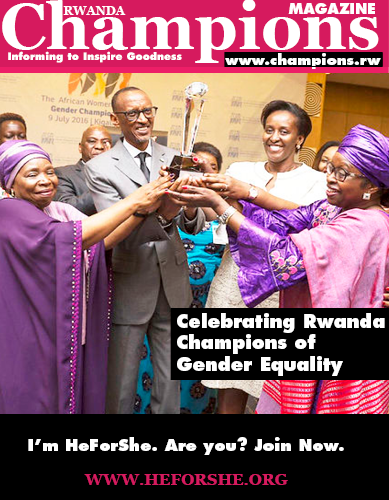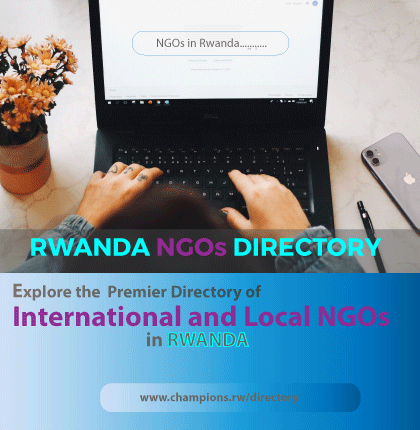UN Women Rwanda launches $6.3 million plan to boost women’s empowerment
UN Women Rwanda has launched a new four-year strategic plan that will require about $6.3 million to expand programs (…)
By YWCA Rwanda
Every year on March 8, the world celebrates the International Women’s Day, reflecting on social, economic, cultural and political achievements of women. More importantly, the day also marks the call to action for accelerating gender equality. This year’s theme “Women in leadership: Achieving an equal future in a COVID-19 world,” aims at celebrating the tremendous efforts by women and girls around the world in shaping a more equal future and recovery from the COVID-19 pandemic.
There is no better time to stand-up for Women’s rights than this time. Some women, especially in developing countries, continue to face harsh situations such as unpaid care work, abuses by their partners, job losses, loss of business and school dropout as a result of unwanted pregnancies among teenage girls due to the impact of COVID-19 pandemic.
Girls’ live talk show in celebration of the 16 days of activism under the campaign on violence against women.
As we celebrate this year’s International Women’s Day, the Young Women’s Christian Association of Rwanda (YWCA Rwanda), urges everyone to stand tall and strong for Women’s Rights. The day would be meaningless if women’s rights are not on the top of the agenda.
YWCA Rwanda is a non-governmental, non-profit organization that works at the grass roots level promoting the world where all women live free from poverty. It is a volunteer membership organization for women established in Rwanda in February 1995. The organization has 500 full members/volunteers with more than 120,000 beneficiaries.
Since 1999, YWCA Rwanda is affiliated to the World Young Women’s Christian Association (World YWCA), a global network of women and young women leading social and economic change in 126 countries.
YWCA Rwanda strives to develop the leadership and collective power of women and girls in Rwanda to achieve high quality education, health and socioeconomic conditions for themselves, their families, and their communities through girls’ programs and Gender Action Learning System.
Reflection on Fundamental Rights of Women and Girls
The fundamental rights of women and girls (such as the right to an education and to a life free from violence) are enshrined in different legal instruments notably the Protocol to the African Charter on Human and Peoples’ Rights on the Rights of Women in Africa, also known as the Maputo Protocol, and others ratified by many African nations, including Rwanda.
However, the power of social norms, such as gender inequalities and under representation of women in leadership, imply that often these guiding legal instruments are not implemented. As a result, millions of women and girls across Africa are discriminated against and denied the opportunity to fulfill their potential in life.
For example, despite the commitments made for universal education provision through the Sustainable Development Goals framework, 52.2 million girls are still missing out on an education in Sub-Saharan Africa – the highest rate in the world.
If action is not taken as a matter of urgency, this situation will deteriorate further as the region has a growing school age population. Defending the rights of women and girls is high on the agenda of the civil society including YWCA.
Creating Awareness on Women and Girl’s Rights
YWCA Rwanda partners with FEMNET and Oxfam in Rwanda to raise awareness on women’s rights through advocacy and online/social media campaigns through the “Strengthened Women Networks for Greater Impact” initiative.
The initiative strives to Strengthen women’s organizations and networks to influence change through advocacy and policy influencing and to raise awareness on women’s rights for a positive shift of attitude and behaviors through campaign.
To address the problem of women’s rights violation, violence against women, women empowerment and gender equality, under “Strengthened Women Networks for Greater Impact” initiative, YWCA uses digital media platforms especially social media (including Twitter, YouTube, Facebook, Instagram, etc.) to help expand outreach and broadens engagement around women’s rights and empowerment.
Social media campaigns through relevant content, experience and dialogue allow individuals to connect directly with other individuals or groups, as well as organizations and communities, thus creating valuable relationships with both online and offline supporters. This raises awareness on specific issues and induces action from decision makers and creates a positive shift of attitude and behaviors.
The “Strengthened Women Networks for Greater Impact” also employs male engagement approach to build a cadre of male gender advocates as change makers and champions of women’s rights and gender equality, and engages policy makers and policy influencers including religious and cultural leaders.
Gender sensitive males are key allies in championing gender equality and women’s rights. The male engagement approach thus demystifies the stereotyping that gender issues are women’s issues and mobilizes men to question the status quo which includes male privileges, attitudes and power in relation to gender equality.
Furthermore, YWCA Rwanda empowers young women and girls through girls’ safe space. This is a place where young women and girls can go to any time to feel safer and empowered and have access to information, education, share experiences and learn from each other.
In the safe space, girls are mentored, given life skills, educated on Sexual and Reproductive Health and Rights (SRHR), financial education and given a platform to speak up on issues that affect their lives.
As we celebrate the International Women’s Day 2021, let’s look back how far we have come, let’s celebrate efforts, milestones and achievements registered, but most of all, let’s stand tall and strong for Women’s Rights.
This article was written by Young Women Christian Association of Rwanda (YWCA Rwanda). For more about our work, visit our website www.ywcaofrwanda.org .
UN Women Rwanda has launched a new four-year strategic plan that will require about $6.3 million to expand programs (…)
UN Women Rwanda has launched a new four-year strategic plan that will require about $6.3 million to expand programs (…)
African women leaders are calling for greater solidarity and collaboration to help more women attain leadership (…)
Women for Women International (WfWI) has appointed Nigerian development expert Thelma Ekiyor as its new global chief (…)

